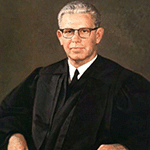
Arthur Goldberg (1962-1965)
Arthur Goldberg lived between 1908 and 1990.
Early Life
Goldberg was born in Chicago in 1908, the youngest of eight children. He graduated from High School at the age of 16, thereafter attending several colleges before earning his law degree from Northwestern University in 1930.
Legal Career
Goldberg quickly became a prominent labor attorney. Once the U.S. entered World War II, Goldberg enlisted and served in an espionage group operated by the Office of Strategic Services—the precursor to the CIA. He was later appointed by President John F. Kennedy as United States Secretary of Labor from 1961 to 1962, eventually making him the last Supreme Court Justice to have served in the United States Cabinet.
Appointment to the Supreme Court
In 1962, President Kennedy appointed Goldberg to the Supreme Court as an associate justice. While Goldberg’s time spent on the bench was short, it was exceedingly instrumental. As the civil rights movement began to dominate the American legal system, Goldberg’s liberal perspective on jurisprudence assisted in shifting the Court’s focus towards broader constructions of constitutional rights.
With pressure from President Lyndon B. Johnson, Goldberg eventually stepped down from the bench in 1965 to serve as U.S. Ambassador to the United Nations. Goldberg’s seat was then filled by President Johnson’s close friend, Abe Fortas. Scholars believe President Johnson appointed Fortas so that he could be notified in advance if any of his Great Society reforms were likely to be deemed unconstitutional by the Court.
Later Years
During his time as Ambassador to the United Nations, Goldberg grew frustrated with his inability to influence the President to end the war in Vietnam. In 1968, he ultimately resigned from his position, thereafter joining the New York law firm of Paul, Weiss, Rifkind, Wharton & Garrison. Two years later, Goldberg ran for governor of New York, which he lost to incumbent Nelson Rockefeller. He then returned to practicing law in Washington, D.C. In 1977, after serving under President Jimmy Carter as United States Ambassador to the Belgrade Conference on Human Rights, Goldberg was awarded the Presidential Medal of Freedom.
Death
Goldberg died in 1990. He is buried in Arlington National Cemetery in Virginia.
Notable Cases
Rudolph v. Alabama (1963)
Escobedo v. Illinois (1964)
Griswold v. Connecticut (1965)








